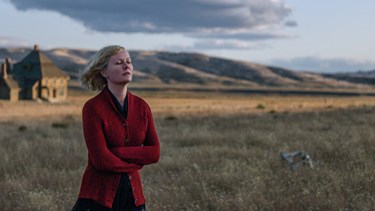
A Kirsten Dunst retrospective at the Paris Theater from January 28-February 3, 2022, includes eight of her best performances, in The Power of the Dog, Interview with the Vampire, The Virgin Suicides, Marie Antoinette, The Beguiled, Melancholia, Drop Dead Gorgeous, and All Good Things.
In her career overview for Queue. "Kirsten Dunst: The Star of The Power of the Dog reflects on her genre-defying career," Krista Smith writes "Since she could walk, Dunst has been delivering nonstop in front of the camera—first as a model, then as a child actor, and now as an accomplished performer and creative collaborator whose filmography spans drama, comedy, blockbusters, and arthouse fare. In sports terms, she’s a utility player; Dunst can do virtually anything."
Below are excerpts from Smith's interview with Dunst. You can also listen to Smith's full conversation here, in an episode of the podcast Present Company.
Krista Smith: I want to talk about Rose [in The Power of the Dog]. Rose is trying to survive in this masculine, unwelcoming world, trying to bring some civility to it, and to protect her son Peter, who doesn’t quite fit in.
Kirsten Dunst: Peter definitely leans toward a peculiar obsession with death and science. He’s a teenager: He doesn’t want to talk to his mother, so there’s already a separation there where she’s trying to understand her son. As a mother, she’s so worried about him in this Western culture rife with toxic masculinity — this kid would thrive in a city, in a place that is accepting of him. So she’s just doing everything to survive and be a supportive mother. She and George meet each other at a time when they’re both desperately lonely — that’s what they recognize in each other’s souls immediately. But once Rose moves to the ranch, his brother Phil, played by Benedict, starts to psychologically torture her and wants her out of there, and Rose just crumbles.
---
Tell me about your experience working with Benedict.
KD: We don’t even really have many scenes together, so I had to create this monster, this demon that frightens me and breaks me down on my own. It’s a very lonely character in that way. Luckily, I love creepy movies like Don’t Look Now or Persona, where you see people deteriorating by themselves. I’m really into cinema like that, so I had a lot of references. That kept things alive for me when I was working alone. Benedict and I never talked to each other on set — that was something that helped create tension between us. When we got together on the weekends or when our kids played, then obviously, we would be nice to each other. He’s very English and apologizes a lot. He’s the kind of guy who’s like, I’m sorry. I’m sorry. So it was good for him, I think, and also for me, not to talk to each other if we did see each other on set.
---
You’ve worked with a lot of female directors, obviously Sofia Coppola — you were her muse with The Virgin Suicides and Marie Antoinette. You’ve worked with Kate and Laura Mulleavy, the founders of Rodarte; you’re a muse for them too, both in their designs and on film. There was Bachelorette, Leslye Headland’s first film. And Little Women with Gillian Armstrong.
KD: I feel like working with Sofia on her debut The Virgin Suicides and having my first role where I was seen as this sexy young woman done through a female gaze was very safe for me and very iconic in this beautiful, very feminine way. Having that before going to do Spider-Man, I had a much more grounded, secure feeling in myself as a young woman. Being directed by Sofia at 16 gave me a sense of security in myself. Having that come from a woman instead of a man really set me up, I think.
---
How was it working with Jane?
KD: Jane’s awesome. She’s very honest and so am I. She’s someone who will come up to you and hug you when you need a hug, and she’s also someone who will tell you your voice sounded really high during that last take. You’re like, Okay, Jane, I guess you want me to lower my voice. I felt like she needed me, too, because we were the girls on set — me and Ari [Wegner], our D.P., who is so brilliant — and she’s used to working with mostly females. I’m very director-driven. So, working with someone like Jane has been something I had craved for a long time.
